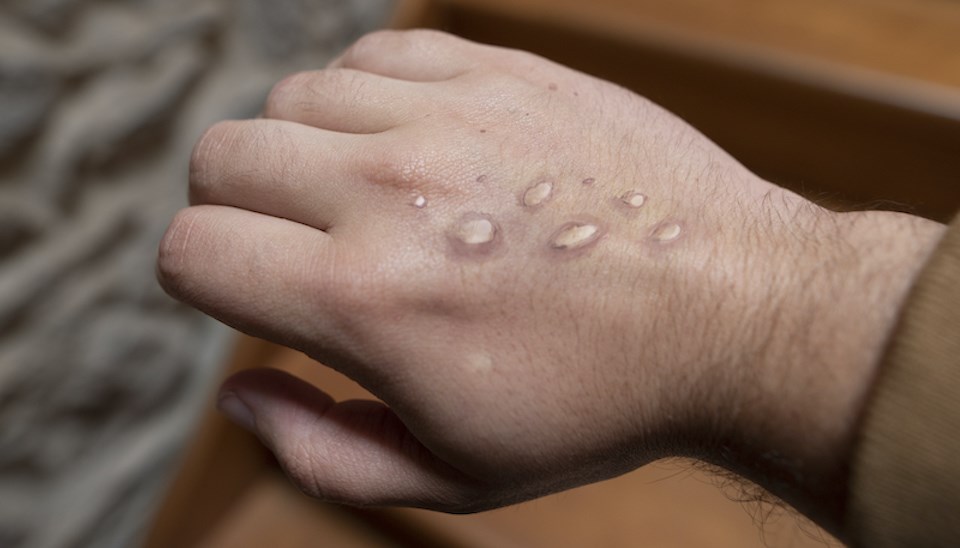A second case of monkeypox has been isolated in British Columbia, part of a global outbreak that has infected nearly 2,000 people across dozens of countries.
The case, identified this week in the Vancouver Coastal Health region, is not related to travel and not connected with the initial case, a spokesperson for the BC Centre for Disease Control confirmed.
As of Friday, June 17, that raises the total confirmed cases in Canada to 168.
Monkeypox is part of a family of viruses that includes smallpox. But while smallpox was eradicated in 1980, monkeypox regularly infects people in central and west Africa, where the disease jumps from those animals that carry it to humans.
Despite its name, monkeypox is not limited to monkeys. Evidence of the virus infection has been found in squirrels, Gambian poached rats and dormice, among other animals, says the World Health Organization (WHO).
Once the virus makes it into a human, it can easily spread to others through physical contact.
“It’s been circulating in the human population for the past 50 years,” said Dr. Catherine Smallwood Friday, monkeypox incident manager for the WHO in Europe.
But the virus has seen a resurgence. In the last 10 years, there have been more recorded cases of monkeypox than in the previous 40 years, Smallwood said, describing monkeypox as a “neglected disease.”
The virus has a mortality rate of up to 11 per cent, and the African continent has so far reported more than 1,500 cases and 72 suspected deaths in its own epidemic.
The latest resurgence has spread beyond people who have a travel history in endemic countries, raising the concern of health officials around the world.
Globally, more than 30 countries have reported 1,880 infections in countries that don't typically report monkeypox, with 85 per cent of cases in Europe. No deaths have been reported.
What happens when you get monkeypox?
Monkeypox has an incubation period of up to 21 days from the point of exposure, though most of the time it lasts between a week to 10 days.
Symptoms often start with a fever, swollen glands and severe fatigue.
Soon a rash will appear, starting as a hard bump on the skin, often located where the skin-to-skin contact occurred.
The bumpy rash will progress into lesions and often spread across the body.
In the past, those lesions were known to progress at the same rate. But now they are appearing to develop under independent timelines.
Over a period of weeks, they can fill with pus, sometimes scabbing over, sometimes breaking open and leaking infectious fluid. Often the lesions can be extremely painful.
“They will be infectious that whole period, right up until the moment the lesions have completely healed and new skin is underneath them,” said Smallwood.
“This is a disease that can take a while to resolve.”
Who is most at risk?
Smallwood said many of the latest cases appear to be concentrated in men who have sex with men.
“It’s a disease we’ve seen for a long time that seems to be behaving in an unusual way and spreading in a new environment,” she said. “That’s why it’s concerning to us.”
As annual Pride events get underway across the world — including Vancouver Pride on July 31 — some have expressed concern that they could present an added risk to the transmission of monkeypox.
“If someone goes to a big festival and they’re sweaty, they take their tops off and they’re grinding against lots of other people’s bodies, then there’s the potential for monkeypox to be passed on that way,” said Will Nutland, director of The Love Tank, a non-profit promoting community health in London, England.
Equally, Nutland said skin-to-skin contact during sex isn’t limited to Pride events and can easily happen after a number of other social encounters.
“We shouldn’t necessarily be pinpointing festivals and Pride events in and of themselves,” he said.
Recognize the symptoms
One of the best things that can be done to reduce transmission, says Nutland, is to educate community organizers about the symptoms of monkeypox. That way individuals can recognize the disease and stay away from big social events if they think they have caught the virus.
As of Friday, the United Kingdom has reported a total of 574 cases, making its outbreak the biggest to date beyond Africa.
Nutland says many of the people currently being hospitalized in London land there because of secondary infections from the lesions.
But the WHO is also watching for more severe outcomes in several often vulnerable groups, such as young children, pregnant women and people who have suppressed immune systems, said Smallwood.
Both warned against stigmatizing any group that might be at highest risk of contracting the disease — something that can easily change.
“Anyone who gets monkeypox has not done anything wrong,” she said. “The outbreak will spread given the opportunities of transmission.”
“They can happen in our daily lives.”
With files from the Associated Press



